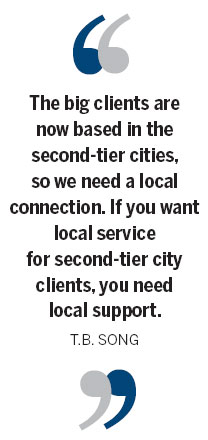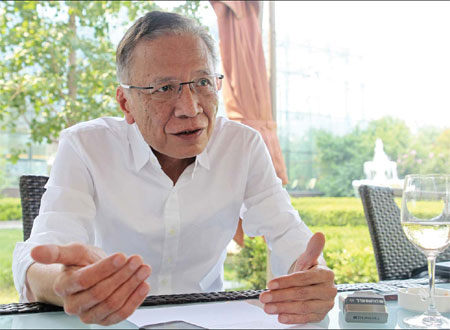Looking ahead to the future

|
T.B. Song is often hailed as the godfather of modern advertising in China. Feng Yongbin / China Daily |
Veteran ad guru says foreign advertising agencies must forge strong local partnerships
Dressed in a crisp white cotton shirt, smoking cigarettes and sipping a glass of Chardonnay, T.B. Song is the modern epitome of the main character from the 1960s advertising drama that aired on AMC - Mad Men.
 |
As chairman for greater China of the large media firm WPP, which grossed 1.3 billion yuan ($20 million, 16 million euros) last year in China alone, he has spent decades helping firms showcase their brands in China. But, while he might be thousands of kilometers from cosmopolitan Manhattan and miles away from the hard-drinking, chain-smoking image of advertising executives in the US cable show, Song oozes the flair and creativity that underpin his authenticity.
Often hailed as the godfather of modern advertising in China, the Taiwan-born ad guru was responsible for opening Ogilvy & Mather's first mainland office in Shanghai in 1991. He is also the chairman of Ogilvy & Mather's Greater China division.
"We partnered with the Shanghai Advertising Agency, and we were the first foreign agency in Shanghai," he says.
"All the companies who wanted to do advertising outside the Chinese mainland had to go through this agency."
Soft-spoken, with an air of nonchalant confidence, Song paints a vivid picture of China's early advertising scene as one of barebones creativity, misunderstood by most local clients.
"At that time we did a full-page advertisement for American Express," Song says, describing the credit card ad as "very simple" with just a single image of the credit card, a slogan and lots of white space.
"When we published this, the head of advertising in People's Daily almost got fired. They said he was wasting space."
Ogilvy & Mather's own 20-people operation at that time reflected just how unfamiliar the advertising industry was to China.
Lacking any substantial number of long-standing advertising companies, Ogilvy & Mather was forced to hire people with little to no experience, paying them wages of around 200-300 yuan per month - a salary that was considered quite high compared with the wages of local agencies.
While solid talent is still hard to come by, the rampant growth of advertising has seen experience and wages skyrocket over the past two decades.
Following the opening of their Shanghai office, Song went on to help open Ogilvy & Mather's Beijing office in 1992, and their Guangzhou office in 1993.
Almost two decades later, he is helping Ogilvy & Mather expand once more - this time to the ripe markets of China's second- and third-tier cities, where global advertising influence is relatively minor.
"As you know, China is a big market and now there is more focus on regional marketing," he says.
With increased regional focus and more Chinese brands looking for areas to expand, China's second-tier cities are a natural progression for local partnerships.
"The big clients are now based in the second-tier cities, so we need a local connection. If you want local service for second-tier city clients, you need local support," Song says.
By partnering with China's advertising agencies in outlying cities, Song is once more helping to revolutionize the way China does ads.
"The first thing we do when we form a partnership is training. We have to change the way they operate and we gradually ask them to adapt to our system."
By working with local clients in cities like Nanjing, Chengdu and even in third- and fourth-tier cities, Song, along with Ogilvy & Mather, is helping create inroads for domestic producers hoping to bring their products to big cities like Beijing and Shanghai, while creating a path for international brands to reach beyond the oversaturated markets in metropolitan areas.
In less-dense areas, advertising, in the eyes of the consumer, is still a powerful voice.
"China still has the highest amount of trust in advertising, compared to the United States," he says, citing a study conducted by Ogilvy & Mather comparing consumer reactions with advertisements in the US and China.
"Long ago in the United States there still was a lot of trust in the brands and advertising, but gradually the trust has gone down. It's the same in China, but here there is still a high level of trust."
While Chinese consumers' trust in advertisements remains strong, 20 years ago, simply having an advertisement was enough to give the brand a big boost, he says.
"It was cheap and at the same time very effective. It was very direct. In the first stage if you were a brand doing advertising on TV, people will feel the brand is trustworthier. It was a very simple situation," he says.
"After that, gradually the competition increased and companies began looking for the consumer needs."
But in the age of Internet ads, where users are bombarded by thousands of messages every time they log on to a computer, the effectiveness of individual advertisements is changing.
Changing with the times, Ogilvy & Mather has recently decided to focus more on Internet and digital marketing, as the growth rate of these industries is nearly double that of more traditional mediums.
According to Song, understanding the consumer is now playing a bigger role in advertising as more clients are looking for ways to set their brand apart from the rest in a fiercely competitive market, Song says.
"If you see all the car brands in China, in the past five or 10 years, every commercial is the same - a car driving on the road," he says.
"Because of the competition, the manufacturers have started looking into the segmentation and to look into the consumer lifestyle and find their emotional boundary. This is just starting, I would say."
Driven by soaring amounts of competition, international agencies like Ogilvy & Mather are perfectly poised to call upon their global standards in advertising to draw in local brands. It is a trend, Song says, that promises another two decades of growth and interesting challenges.
"I think there will be big growth for the next 20 years. The trend is changing, but it's good," he said. "We've got a long road ahead."
toddbalazovic@chinadaily.com.cn
(China Daily 09/07/2012 page6)
Today's Top News
- Experts share ideas on advancing human rights
- Japan PM's remarks on Taiwan send severely wrong signal
- Key steps to boost RMB's intl standing highlighted
- Sustained fight against corruption urged
- Xi calls for promotion of spirit of volunteerism
- Xi calls for promoting volunteer spirit to serve national rejuvenation































